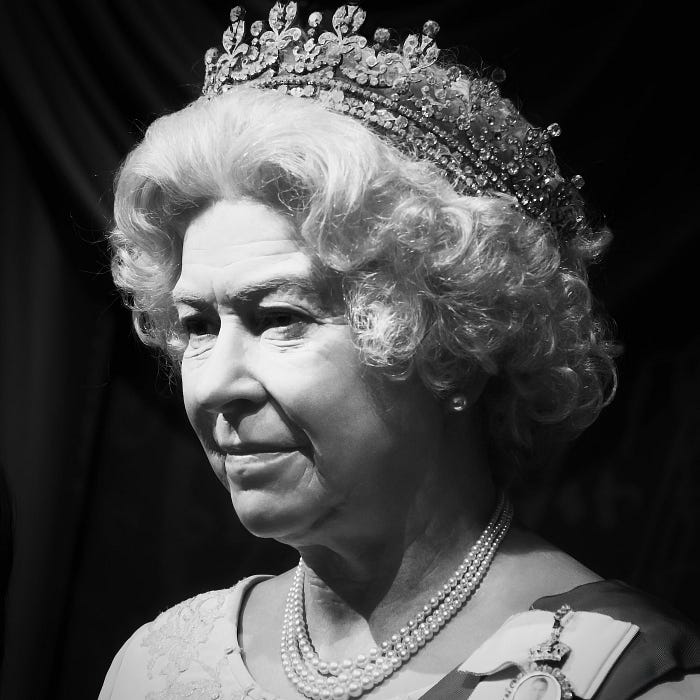

Lessons on Longevity from Queen Elizabeth II
source link: https://robertroybritt.medium.com/lessons-on-longevity-from-queen-elizabeth-ii-c5351c20c73d
Go to the source link to view the article. You can view the picture content, updated content and better typesetting reading experience. If the link is broken, please click the button below to view the snapshot at that time.
Lessons on Longevity from Queen Elizabeth II
How long people can live, and live in good health, may surprise you

A waxwork of Queen Elizabeth II at Madame Tussauds in London. Image: Unsplash/Mathew Browne
Queen Elizabeth II, who died at age 96 today, had a long and storied life, reigning as monarch in Britain longer than anyone in history. But the queen, who must’ve had some good genes and was known for living a relatively healthy and productive existence, didn’t live near as long as a lot of people do these days. Her longevity, nonetheless, is a reminder that life expectancy (how long people live on average) and lifespans (what’s possible) are wildly different.
Average life expectancy for a woman in the UK born in 2020 is 82.9 years.
(Life expectancy predicts a person’s expected lifespan at birth if existing death rates were to remain consistent.)
How’d the queen beat the average by more than a decade? One key was simply making it to her 80s.
“Death rates, which increase exponentially up to about age 80, do decelerate thereafter and reach or closely approach a plateau after age 105,” scientists reported in a 2018 paper. The older you get, according to the logic, the more diseases you’ve avoided or survived, and there’s some not-entirely-understood but obvious robustness that’s carrying you through.
Modern medicine has helped a lot, of course. As I wrote in a piece about the theoretical and practical limits to how old humans might ever be, the maximum possible lifespan:
In 1990, there were 95,000 centenarians (people 100+). Thanks to both a growing population and improvements in health care, that number swelled to 451,000 by 2015 and is expected to reach 3.7 million by 2050.
So how long might you or anyone else live with ongoing medical advances? While science can’t say for sure, many experts see a practical limit of around 130 to 135 years, but they leave open the possibility of some future human hanging in there until around 150. But regardless of any future breakthroughs that help more people survive into their 90s or beyond, death is likely to remain pretty much inevitable, and despite the dreams of some techno-futurists, there’s probably a practical ceiling.
You can certainly up your odds of keeping your feet on this good Earth for a long time. Just walking 22 minutes a day, for example, can help add years to your life by warding off a heart attack and other diseases. Getting better sleep, too, is crucial for staying healthy and living longer. And lucky you: Physical activity improves sleep, and better sleep will make you sharper and more energetic, more apt to take that walk.
Anyone who might live to 150, or 135, or even 96, would hope to retain their faculties, of course. And despite the growing number of dementia cases in an increasingly older population around the world, dementia is not inevitable, and science is making significant advances in understanding how each of us can increase the odds of avoiding severe mental decline later in life, regardless of our genes.
Consider the so-called superagers, whose brains, even at age 81, are as intact as people in their 20s.
“The structure of superagers’ brains and the connectivity of their neural networks more closely resemble the brains of young adults,” says Alexandra Touroutoglou, PhD, director of imaging operations at Massachusetts General Hospital’s Frontotemporal Disorders Unit. “Superagers had avoided the brain atrophy typically seen in older adults.”
Queen Elizabeth II is an outlier, for sure. And she’s just one anecdote. She was known for working 40-hour weeks into her 90s. She probably didn’t have to. (And, several readers have pointed out, privilege and access to excellent health care—both known to up the odds of a long life—were on her side.)
But her level of effort, a penchant for routine, and a strong sense of purpose, along with setting aside time for play, are thought to have served her well-being well, wrote Bryan Kozlowski in his book Long Live the Queen. She was also known to indulge in sweets and alcohol, but in moderation. Among her enduring traits was that she embraced her age, even as it kept coming, and coming.
Research has shown that embracing aging, rather than fearing it, is actually linked to living longer.
Maybe today’s quiet quitters and early retirees could take a longevity cue from the queen’s example. If you stop working or scale way back, find something to keep your brain and body active. If you want to live to be 96, anyway.
Your support makes my health and science reporting and writing possible. You can sign up to receive an email when I publish a story, or become a Medium member to directly support me and other writers and gain full access to all Medium stories. Also, check out my wellness podcasts at Knowable. — Rob
Recommend
About Joyk
Aggregate valuable and interesting links.
Joyk means Joy of geeK